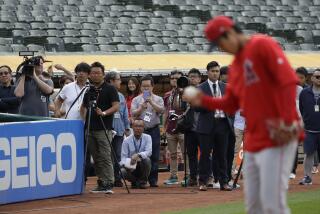Reporter’s Notebook : For a Japanese Wife, a New Role
- Share via
TOKYO — Prime Minister Yasuhiro Nakasone’s wife, Tsutako, has played an unusually active role for the wife of a Japanese leader at the Tokyo summit.
On Monday, she took her Canadian, West German and Italian counterparts to a performance of kabuki, a colorful Japanese drama form characterized by highly exaggerated stage motions, accompanied by drumming and chanting.
On Tuesday, Nancy Reagan joined Mrs. Nakasone’s cultural tour for a toned-down version of another Japanese art form, the tea ceremony. Mrs. Nakasone also took the American First Lady to visit a local elementary school.
Although the schedule may not seem unusually hectic for the wife of an American or European leader, it is highly unusual for a Japanese First Lady to maintain a separate official schedule or even to appear regularly in the public eye.
After all, both the informal word for wife in Japanese-- kanai --and the polite one-- okusan --mean “someone in the house.” There is no Japanese equivalent at all for the American expression “First Lady.” And, until this summit, Mrs. Nakasone’s appearances were rare. Most Japanese citizens did not know her first name.
Prime ministers, like other Japanese men, tend to keep their wives in the background. Most socializing is done by men, and Japanese husbands are more likely to introduce male visitors to bar hostesses than to their wives.
Thus, by taking her fellow wives around Tokyo, Mrs. Nakasone is doing something most Japanese women never do--entertaining the wives of their husbands’ business associates.
Seen on the streets of Tokyo: one matronly woman wearing a sweat shirt with the label “flesh” in English emblazoned across the front.
English crops up in other unlikely places, too. A bus identified as the Fairy bus lumbers through downtown Tokyo, its unusual name painted in italics. Pocari Sweat is the brand name of a Gatorade-like drink favored by Japanese athletes. Creap is a best-selling non-dairy creamer.
Giving objects English names is part of a current Japanese trend to treat foreign letters more or less as decoration, without much attention to their meaning--just as American cosmetics manufacturers give their products names such as Jade East and Hai Karate.
But what sets the Japanese apart is a tendency to translate Japanese concepts straight into English. So what the Japanese sweat shirt maker probably intended to say was “fresh.” Unfortunately, the letters “L” and “R” are interchangeable to many Japanese ears.
The Japanese, in calling a woman fresh, mean that she is demure. Most Japanese would not know that a woman with “flesh” lettered onto her sweat shirt probably would be considered something less than demure.
One of the biggest hits here was the free food dished up daily at the New Otani Hotel for journalists covering the summit. With the dollar taking a nosedive against the yen, media expense accounts have been straining to keep up with restaurant bills that run $16 for breakfast (scrambled eggs, toast and coffee), $35 for a lunch of tempura and more than $100 per person for dinner.
But the demand for free sushi and beer quickly exceeded the supply, and a headline in Tuesday’s Japan Times says: “Free Meal Media Vultures Cause Otani ‘Food Shortage.’ ” The New Otani found itself running out of food.
To compensate for the oversized appetites of the Western press, the hotel management clamped time restrictions on meal hours. Show up late, and the kitchen is closed.
The Japanese government, which is paying for the food, thought 4,000 free meals a day would be enough. On Sunday, the opening day of the summit, the hotel larder was decimated when 4,900 meals were served, almost 25% more than than anticipated.
Times staff writer Eleanor Clift contributed to this notebook.
More to Read
Sign up for Essential California
The most important California stories and recommendations in your inbox every morning.
You may occasionally receive promotional content from the Los Angeles Times.













